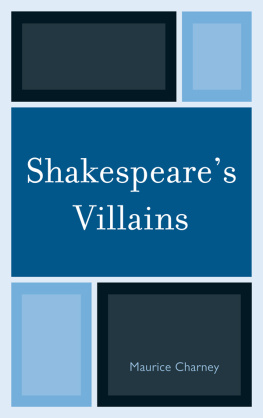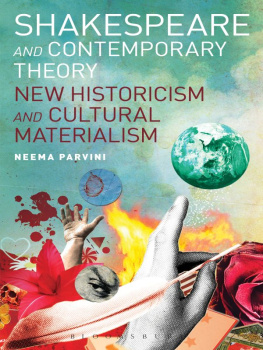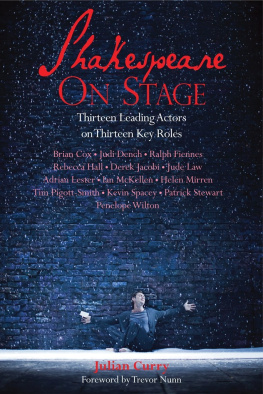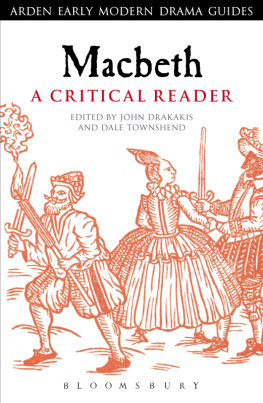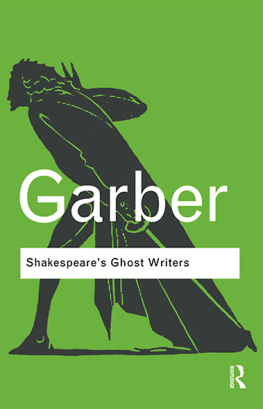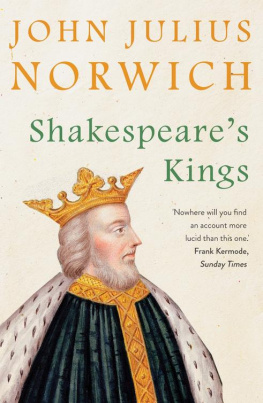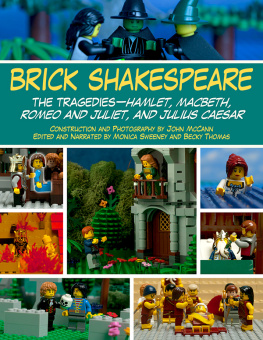Shakespeares Villains
Chapter 1
Iago
Iago is Shakespeares archetypal villain, who defines the parameters of what it means to be a villain. Id like to start with him and then move on to other related figures. By the time that Shakespeare wrote Othello , probably around 1603 or 1604, he had already created significant villains such as Aaron in Titus Andronicus, Richard, Duke of Gloucester in 3 Henry VI and Richard III , Shylock in The Merchant of Venice , and Claudius in Hamlet . Iago is not quite the same as these figures, but he sums up a whole series of characteristic traits and attitudes.
The first point to consider is Iagos absolute contempt for Roderigo, which echoes Sir Tobys relation with Sir Andrew in Twelfth Night. We hear again Sir Tobys constant reminder Thou hadst need send for more money (2.4.18283) in Iagos repeated refrain: Put money in thy purse (1.3.335), which occurs four more times in this same speech and is echoed in the first line of Iagos soliloquy: Thus do I ever make my fool my purse (374). Iago wants to be sure that the audience knows that Roderigo is not his friend and that his supposed support of Roderigos wooing of Desdemona is done solely for monetary gain. Iago is eager to convince the audience of his absolute contempt for Roderigo and of his own superiority to such a fool:
For I mine own gained knowledge should profane
If I would time expend with such snipe
But for my sport and profit. (37577)
Snipe (either in the singular or the plural) are foolish birds easily caught, which, like the woodcock, Shakespeare uses frequently to express contempt. Part of Iagos disdain for everyone, especially his enemies, comes from his feeling of great superiority.
Notice that he is duping Roderigo not only for his profit but also for his sport. This is an expression of Iago the hunter, who enjoys tricking his antagonists for the sheer pleasure of the game. Sport bears significantly on Iagos motives, since it implies that he enjoys his plots for their own sake and not for any ulterior purpose they may serve. Sport offers a way of understanding Coleridges otherwise puzzling account of Iagos motive-hunting of motiveless malignity. This use of sport implies that the villain, in this case Iago, delights in his own sense of triumph. The word sport celebrates the villains creative energies, much like that of the playwright in writing his play.
There is a similar feeling in Act V in Iagos plot to use Roderigo to kill Cassio. Iago uses a slangy term to express his utter contempt for Roderigo: I have rubbed this young quat almost to the sense,/And he grows angry (5.l.1112). This is the only use of quat in Shakespeare, and it refers to a pimple, a pustule, or small boil. Rubbing to the sense is a painful image of rubbing something raw. Iago has only disdain for Roderigo and for Cassio too:
Now, whether he kill Cassio,
Or Cassio him, or each do kill the other,
Every way makes my gain. Live Roderigo,
He calls me to a restitution large
Of gold and jewels that I bobbed [stole] from him
As gifts to Desdemona.
It must not be. (1218)
Iago is ruthless and sociopathic in his utter disregard for human life. Like most of Shakespeares villains, he is a killer and only interested in his own successhis gaineven if it involves the deaths of Roderigo and Cassio. Iago finishes by stabbing Roderigo, who calls him damned Iago! O inhuman dog! (62). This is Shakespeares familiar negative image for dogs.
Iago expresses his contempt for Cassio very early in the play. Othello has passed him over for promotion in favor of Cassio, a bookish man unschooled in the practice of war:
And what was he?
Forsooth, a great arithmetician,
One Michael Cassio, a Florentine,
(A fellow almost damned in a fair wife)
That never set a squadron in the field,
Nor the division of a battle knows
More than a spinster; unless the bookish theoric,
Wherein the tongud consuls can propose
As masterly as he. Mere prattle without practice
Is all his soldiership. (1.1.1524)
Other than what he says himself, we never have any basis for thinking of Iago as an excellent soldier, well schooled on the battlefield. Again, we should note that he downgrades Cassio because he is a Florentine and not a Venetian, in the same way that Iago thinks that Othello is not really a Venetian but an extravagant and wheeling stranger/ Of here and everywhere (13334).
Iago accuses Cassio of having sex with his wife, as if Othello were a revenge play and Iago were getting even with his enemies. But Othello is emphatically not a revenge play, or only a mock revenge play, and Iago is only fantasizing about a whole string of possibilities that are never developed in the play. We know, of course, that neither Othello not Cassio is cuckolding Iago, but Iagos mind runs idly on this conjecture:
Ill have our Michael Cassio on the hip,
Abuse him to the Moor in the right garb
(For I fear Cassio with my nightcap too).... (2.1.3068)
Cassio is totally unaware of Iagos machinations, even after he has made Cassio drunk and Othello has dismissed him as his lieutenant. Afterward, when Cassio engages Iago to help him recover his lieutenancy, upon leaving Cassio praises Iagos honesty: I never knew/A Florentine more kind and honest (3.1.3839). In other words, Cassio, who is a Florentine and not a Venetian, does not believe that even a Florentine could be more kind and honest than Iago. We are getting caught up in the tragic irony of the play.
One of the most revealing indications of Iagos diabolical impulses occurs in Act V, scene i in his plot against Cassio. His life is of no importance to Iago, but there is another underlying motive:
If Cassio do remain,
He hath a daily beauty in his life
That makes me ugly.... (1820)
This is startling. What is there in Cassios daily beauty that could make Iago ugly? Daily beauty in this context presumably indicates a beauty that a person possesses every day in daily life. It is something that someone has without any conscious effort. Obviously, Iago is aware that he doesnt possess any daily beauty in his life, which immediately makes him alert to his own ugliness. This shows him at his most poisonously envious, but it also uncovers an insight into his own diabolic nature, which is like that of Miltons Satan observing Eve in the Garden of Eden in Paradise Lost . The daily beauty of Cassios life has never been remarked on by anyone else in the play, not even by Bianca. It seems as if Iago, in order to be superior, needs to destroy everyone in the world besides himself, especially Cassio and his daily beauty.
Iagos contempt for Roderigo and Cassio offers us a way of understanding his even greater hatred for Othello, which he begins to show in his second speech in the play. Iago is enraged that the Three great ones of the city who sued to Othello on his behalf are put off. Othello Evades them with a bombast circumstance,/Horribly stuffed with epithets of war (1.1.1213). It is interesting how immediately Iago situates his conflict with Othello in terms of style (which we shall discuss more fully at the end of this chapter). He prides himself on being a plain speaker, a soldier, but of course this is manipulative and hypocritical, since Iago can use so many different styles that suit his nefarious purposes. Othello more honestly makes the soldiers claim of being a plain speaker, as he tells the Venetian Senators: Rude am I in my speech,/And little blessed with the soft phrase of peace (1.3.8182). Iago accuses Othello of a bombastic stylebombast was the cotton stuffing used to pad out a jacketfull of circumlocution (circumstance); in other words, an oratorical style. Othello does speak very grandly in the play before he is overcome with jealousy, but then he switches to Iagos more curt style. That is one of the shifts that marks the success of Iagos seduction.
Next page
